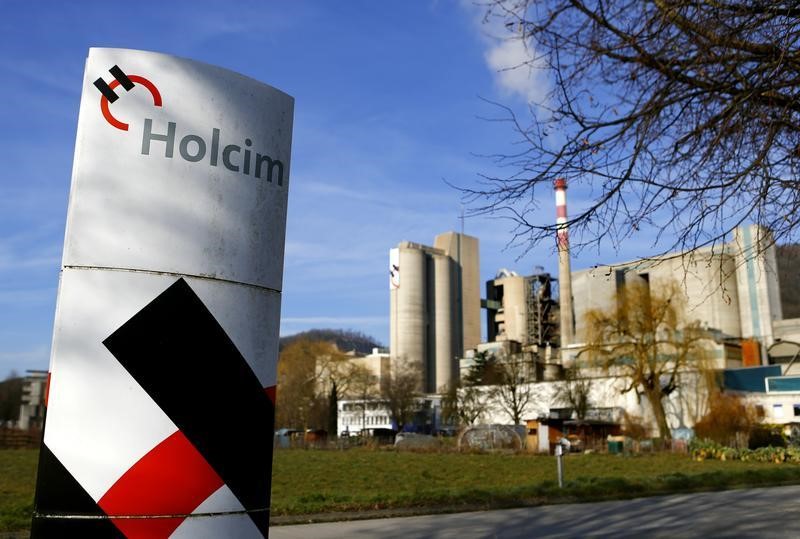Investing.com’s stocks of the week
By Leila Abboud and Oliver Hirt
PARIS/ZURICH (Reuters) - Switzerland's Holcim (VX:HOLN) called a halt on Monday to its merger with Lafarge (PA:LAFP), pressing the French company to renegotiate the deal terms and putting their plan to create the world's biggest cement maker at risk.
The deal was presented as a marriage of equals in April 2014, although the terms meant Holcim shareholders would end up with 53 percent of the combined company.
Since then, diverging performances both in terms of company results and share prices, exacerbated by a surge in the Swiss franc against the euro after the Swiss central bank abandoned a currency cap, have strengthened Holcim's position.
The Swiss company's largest shareholder has been pressing for a revision of the agreement for some time and now the board has stated the deal will not happen without a renegotiation, both of the price and management positions.
"The Holcim board of directors has concluded that the combination agreement can no longer be pursued in its present form," Holcim said in a statement, saying it was ready to talk about the share exchange ratio and "governance issues".
Lafarge was given an equal number of board seats in the new company and its Chief Executive Bruno Lafont was to be its head with Holcim boss Wolfgang Reitzle remaining chairman.
A person familiar with the situation said Holcim no longer accepted that Lafont should head the new company, while a top 10 Holcim shareholder said seven seats each on the board was no longer deemed a fair split.
Lafarge said in a separate statement it would consider revising the share exchange ratio, but nothing else. A second person familiar with the situation said the French group still wanted to get the deal done but not at any cost.
"Lafarge's board of directors remains committed to the project that it intends to see implemented," Lafarge said.
In a sign that the matter could become political, a source in France's Socialist government said it wanted to ensure that any group that emerged would retain roots in France.
"The government is keeping a close watch on this matter and making sure that the deal maintains a solid base and decision-making centres in France," the source told Reuters.
Bernstein Research said the two boards had both taken "tough negotiating positions" with some flexibility on the share ratio, but little on the governance issues.
"For us, this leaves the issue of an adjustment or break-up wide open," the analysts wrote.
MARRIAGE OF EQUALS?
According to the person familiar with the situation, Holcim has proposed changing the agreed one-for-one share exchange ratio to 0.875 Holcim shares for each Lafarge share, but the French company wants a 0.93 to 1 ratio.
"There are more announcements and more posturing to be made by the respective shareholders. This will no doubt be a volatile time because we have to wait a few weeks before we have a general meeting where the shareholders have to vote," said Sandra Crowl, a member of the investment committee at Carmignac Gestion which owns Holcim shares.
"We thought that 1-to-1 was favourable for Holcim and if it stays at that level we're still favourable," she said. "We're very bullish for a joint company going forward and we expect it to be market leader in the industry."
At 1450 GMT, Lafarge shares were trading down 5 percent at 61.75 euros, nearly 13 percent below their implied value under the original deal terms and roughly 1.5 percent above their value under an exchange ratio of 0.875.
Holcim was down 1 percent at 74.7 Swiss francs.
The cement saga is reminiscent of the ill-fated Publicis-Omnicom alliance last year which foundered after Publicis accused its larger rival of a power grab ahead of the closing.
Nearly a year after trumpeting a merger of equals the advertising agencies walked away from the deal amid disagreements over the company structure and management roles.
The differences between Holcim and Lafarge came to a head during the transition period in which they were seeking antitrust approvals globally and selling off assets to comply with various regulators' requests. Approvals for the deal are still needed in India, the United States and Canada.
Shareholders of both companies still have to ratify the deal and some on the Holcim side had been agitating for change, including investor Thomas Schmidheiny who owns a 20 percent stake.
On Feb. 2, Holcim and Lafarge agreed to sell a chunk of their European businesses to Irish group CRH (I:CRH) to secure approval for the merger from European Union competition authorities.
CRH shares fell 4 percent on Monday as concerns mounted that its acquisition would fall victim to the Lafarge-Holcim differences. The French and Swiss firms must pay CRH a break-up fee of 157.8 million euros if they walk away from the sale.
There is a break-up fee of 350 million euros in the Holcim-Lafarge merger agreement.
